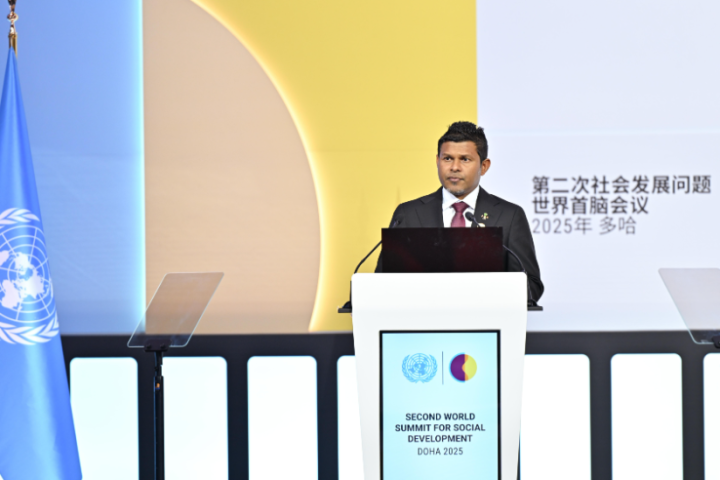MALE’, Maldives — Qasim Ibrahim, a prominent businessman and leader of the Jumhooree Party, has publicly condemned the decision by some resorts to pay service charges to employees in Maldivian Rufiyaa (MVR) instead of U.S. dollars, calling it unfair and potentially illegal. Qasim Ibrahim, commonly known in the Maldives by his first name, who previously served as Minister of Finance and Treasury, Minister of Home Affairs, and Governor of the Maldives Monetary Authority, contends that this practice violates workers’ rights and may contravene the country’s Penal Code.
In a recent statement shared on social media, Qasim highlighted the implications of the Foreign Exchange Act, which has been in effect since January. The law mandates that resorts exchange a portion of their dollar-based income with Maldivian banks. Specifically, Category A resorts—high-end establishments that form a cornerstone of the Maldives’ tourism-driven economy—are required to exchange either $500 per tourist or 20 percent of their total monthly revenue into local currency. While this provision aims to stabilize the local economy by increasing MVR liquidity, Qasim emphasized that it should not come at the expense of employees’ earnings.
“Service charges are collected from tourists in dollars,” Qasim said. “Therefore, these charges should be paid to employees in dollars.” He argued that paying service charges in MVR without employees’ consent could be considered a form of “deprivation of another person’s property by fraud or theft” under Article 212 of the Maldives Penal Code. Qasim further described the obligation to return funds in the currency in which they were received as both a legal and religious duty, underscoring the ethical dimensions of the issue.
Qasim, who owns and operates Category A resorts employing thousands of workers, acknowledged the operational challenges resorts face under the new law. The requirement to exchange dollars with local banks can strain foreign currency reserves, particularly for businesses reliant on dollar-based transactions. However, he insisted that these difficulties should not justify practices that impose financial losses on employees. “This is a fundamental right of employees,” he said, noting that converting dollar-based service charges into MVR often results in a lower real value for workers due to exchange rate fluctuations.
The controversy extends beyond service charges. Qasim also expressed concern about reports that some companies plan to pay salaries in MVR, even when employment contracts stipulate payment in U.S. dollars. “If an employee has contracted to be paid in dollars for a specified period, the salary must be paid in dollars during that period,” he said. Changing the currency of payment without an employee’s consent, he argued, violates the terms of such agreements and erodes trust between employers and workers.
Qasim’s remarks come amid broader scrutiny of labor practices in the Maldives’ tourism sector, a vital engine of the nation’s economy. The Maldives, known for its luxury resorts and pristine beaches, attracts millions of tourists annually, generating significant revenue in foreign currency. Service charges—typically a percentage of a guest’s bill—are a critical component of resort workers’ income, often supplementing modest base salaries. For many employees, receiving these charges in dollars provides a hedge against the volatility of the MVR and ensures greater purchasing power in an economy heavily reliant on imported goods.
The decision by some resorts to pay service charges in MVR has sparked debate about fairness and compliance with labor laws. Qasim warned that employees who refuse to accept payments in local currency could seek legal recourse, predicting that courts would likely rule in their favor. “I believe that if an employee refuses to accept a service charge in MVR without their consent and takes the matter to court, the outcome will be clear,” he said.
As a former Speaker of the Constitutional Assembly and a seasoned political figure, Ibrahim’s comments carry significant weight in the Maldives’ business and political spheres. His extensive business portfolio, which includes resorts, shipping, and trading enterprises, has earned him a reputation as one of the country’s wealthiest individuals. However, his career has not been without controversy. In the past, Qasim has faced allegations of salary disputes with employees at his businesses, as well as claims of receiving undue advantages from ruling governments and engaging in controversial dealings with courts, though he has consistently denied any wrongdoing.
The debate over service charge payments highlights broader tensions in the Maldives’ economy, where the influx of foreign currency from tourism must be balanced against the need to maintain a stable local currency. The Foreign Exchange Act was introduced to address these dynamics, but its implementation has raised questions about how businesses can comply without compromising workers’ rights. For now, Qasim’s outspoken criticism serves as a call to action for resort operators to prioritize employee welfare and adhere to the spirit of the law.












